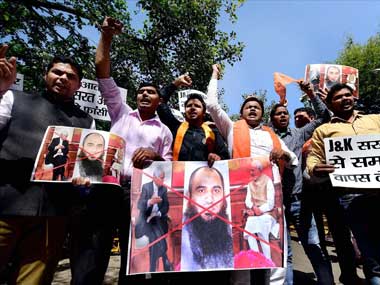The events in Jammu & Kashmir have created an unprecedented political situation. For the second time in just six days, both the Prime Minister and Home Minister have been forced to condemn the actions of a nine-day old state government, of which their party is an equal partner.
The PDP has sought to deflect some of the national outcry by its unilateral decision to release Masarat Alam, by claiming that the decision not to file fresh charges against the separatist leader was taken during the 49-day Governor’s Rule in the state.
However the writing seems to be on the wall – the PDP-BJP marriage in Jammu and Kashmir is falling apart right at the honeymoon stage.
The BJP in particular is totally disillusioned and disenchanted. However it is still willing to give its partner a bit more time to mend its ways and see if the alliance can be salvaged for the betterment of all concerned. However the party leadership is no longer willing to be a submissive partner in the alliance, and now want to have an equal say in decision making over all critical issues.
The state unit of the party has already lodged a formal protest with the PDP and demanded that Alam be rearrested. Additionally, the manner in which both Narendra Modi and Rajnath Singh spoke in Parliament is amply reflective of the prevailing mood in the BJP.
The embarrassment of J&K chief minister Mufti Mohammed Syeed’s unilateral decision to release hard line separatist Masarat Alam is too much for the BJP government.
Modi began his intervention in the Lok Sabha by saying, “I lend my supportive voice to the furore that is there in this House and in the country. This country has never dealt with separatism and terrorism along party lines, and nor will ever it in the future. Today again this House should be united in expressing its outrage over any such incident. I want to assure the House that whatever has happened there (J&K) after the formation of the government, the centre has neither been consulted, nor been informed… Through this House I want to tell the nation that this government (centre) will not tolerate any such act.”
Rajnath Singh who spoke first in Lok Sabha, asserted that he was not satisfied with the initial report (on Marasat Alam) sent by the state government and later added that after receiving full report from there “the centre would issue strongest possible advisory”.
It was interesting to see that at no point in time during their interventions in Lok Sabha and Rajya Sabha, did Modi and Rajnath Singh try to defend the state government even once. In fact they sounded incensed with Chief Minister Mufti Mohammed Syeed, although they didn’t name him.
Singh in fact even said the need to for them to form a government with PDP in J&K would not have arisen if the Congress and others had come together for the purpose.
“We never had any relation with him (Mufti). You had a long association with him. Our’s relation is only nine days old. Koi rang Chada hoga toh apka chada hai. Jis chaman ko apne Ujad diya tha hum use abad karne ke kosis kar rahe hai. Yes there is a coalition government. But the BJP wouldn’t ever compromise on any issue that would possibly go against national interest.”
With each passing day, the BJP is realising the hard way that there are many challenges they will have to confront.
In the last nine days alone, there have been three controversies – Mufti thanking Pakistan, militants and Hurriyat for ‘allowing’ peaceful elections in the state; PDP leaders asking for the return of the mortal remains of Afzal Guru, and now finally the release of Masarat Alam) – which have had national repercussions.
The BJP was also not happy with the portfolio allocation to its ministers, as also to Sajjad Lone who became a minister on the BJP quota. But for the sake of the smooth functioning of the coalition it chose not press hard on that issue. However Mufti’s continued signalling to the party’s social constituency has made things increasingly difficult for the BJP.
Former home secretary and BJP MP from Ara, RK Singh may have spoken out of turn when he said “if it continues to be so, then the BJP will have to review its alliance with the PDP”, but he was clearly articulating the prevailing sentiment held by a majority of BJP leaders and workers.
Another party leader said the events unfolding in Kashmir had the potential to greatly damage the BJP in the rest of the country.
In a mere nine days, the BJP is suddenly left with three major challenges in this regard. First, it must convince its core social constituents and cadre of its innocence; second, it has to smoothly carry on proceedings in Parliament so that it can debate and pass key legislations including the Insurance and land acquisition bills; and third, it has to make Mufti and the BJP understand that they are equal partners in the state government.
The problem gets further compounded by the fact that since the time of its formation, its erstwhile avatar, Bharatiya Jansangh Kashmir has always been part of its core ideological issue –`Ek desh mein do Vidhan, do Pradhan aur Do Nishan nahi challenge’ (A single country can’t have two constitutions, two prime ministers and two national emblems). Its emotional connect with the state comes from the rather unfortunate circumstances in which the party’s founder Dr Shyama Prasad Mukherjee died six decades ago.
Modi’s response to opposition taunts, “Kripa kar hume deshbhakti na sikhayen (please don’t lecture us on patriotism)” was also meant to assure his party workers and sympathisers that he wouldn’t allow a sell out of core values. But an alliance with PDP is proving to be a risky tightrope walk.


